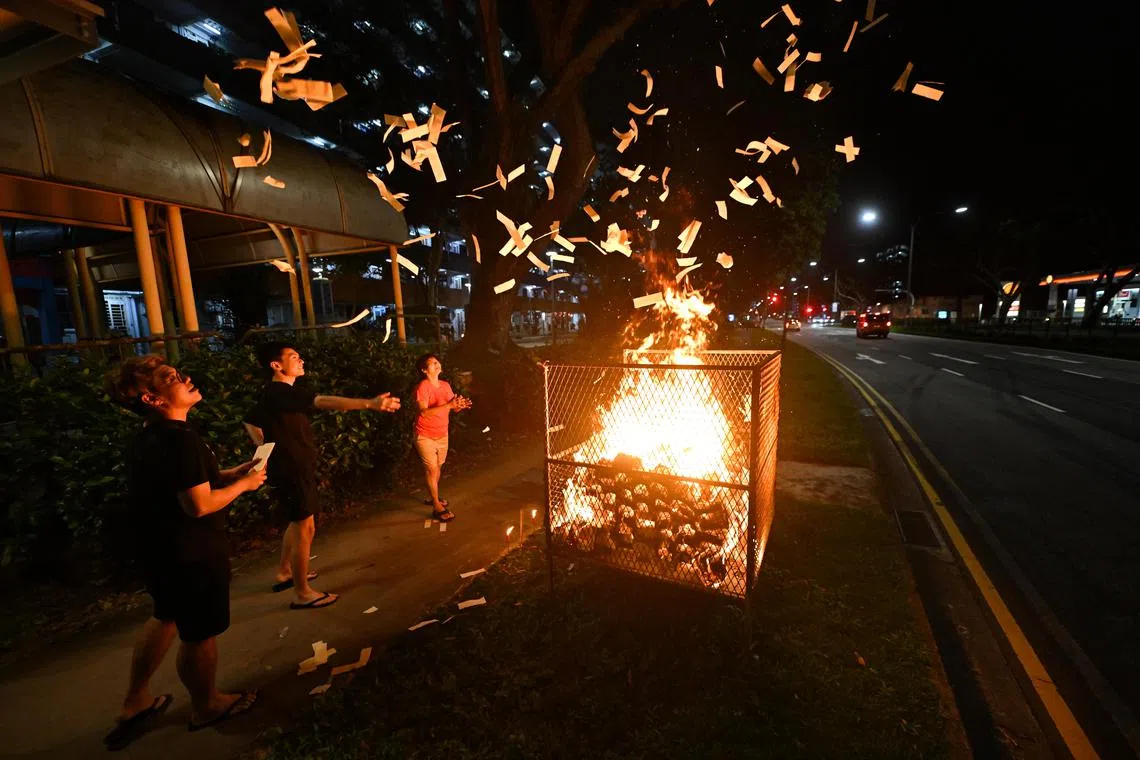Burn, don’t fling: Community leaders bust myths on joss paper and offerings for Hungry Ghost Festival
Sign up now: Get ST's newsletters delivered to your inbox

The key message is to be considerate towards the environment and neighbours when burning offerings.
ST PHOTO: LIM YAOHUI
Follow topic:
SINGAPORE - More does not mean better when it comes to burning joss paper to one’s deceased ancestors, as the practice is meant to be about piety and compassion – not a transaction.
This was one of the messages from three panellists at a Mandarin dialogue organised by the Alliance for Action on Norms for Joss Paper Burning at the Singapore Federation of Chinese Clan Associations (SFCCA).
Hosted by getai artiste Lee Pei Fen, the dialogue on Tuesday helped dispel common misconceptions around rituals ahead of the seventh lunar month, which starts on Aug 16 this year. This is when some people will be burning joss paper, among other things, to mark the Hungry Ghost Festival.
Speaking to about 100 attendees, Master Chung Kwang Tong, secretary-general of Taoist group Quan Zhen Cultural Society, noted that some devotees believe they have to keep increasing their offerings annually to show their gratitude or seek more blessings.
For example, if they burn $20 worth of offerings this year, they may increase this to $30 the following year. Many are also splurging on elaborate paper effigies such as the latest iPhone models or luxe mansions, hoping that their departed loved ones would enjoy their afterlife.
Master Chung said: “It’s not these tangible offerings that matter, but the intangible sincerity. Devotees can also donate to temples and contribute to charitable causes instead.”
Dumping a whole pile of joss paper into the burner at one go is also counterproductive as they may not burn properly, said Master Dong Nong Zheng, a geomancer and interpreter of Chinese customs and folk beliefs.
“They may not be burned properly, and the intended recipients will not get the offerings,” he said.
Asked by several members of the audience about the proper way of burning joss paper, Master Dong said they should not be tossed in the air, as shown in some Chinese period dramas. Joss paper is meant to be burned, he said.
Some also asked how long it will take for food offerings to be “consumed” by the intended recipients.
Master Dong said many devotees leave the offerings out in the open overnight, thinking that this will give the recipients more time to enjoy them. Instead, this attracts pests.
“You can clear them once an incense stick is burnt out, which takes about 15 to 20 minutes,” he said.
The alliance’s key message is to be considerate towards the environment and neighbours when burning offerings. This can be done by burning smaller amounts of joss paper to reduce smoke and ashes, clearing up offerings after prayers, joining communal prayers in nearby temples, and not tossing or scattering the offerings.
Venerable You Guang, Abbot of Dong Xun Ge and secretary-general of the Singapore Buddhist Federation (SBF), said rather than going for quantity, devotees may opt for prayer products of better quality, such as environment-friendly joss sticks.
For those who are burning joss paper, Ven You Guang said: “Burn just a little, piece by piece. Our actions must not inconvenience others, like the cleaners who have to clean up the mess.”
And it is more meaningful to buy less, and to channel some money to charity instead, he added.
Formed in July 2022, the alliance comprises more than 10 Chinese religious, cultural and industry associations. SFCCA, SBF and Taoist Federation (Singapore) are among the organisations with representatives leading the efforts to get people who burn joss paper to be socially responsible.
Since then, it has been embarking on a public education campaign to raise awareness on the correct way of joss paper burning.
In February, it said the number of complaints over burning joss paper during the Chinese New Year period fell by 70 per cent, from 886 cases in 2022 to 282 cases in 2023.
At the dialogue, audience members made some suggestions, such as to ban the import of low-quality incense that may pose health and environmental risks, and for similar conversations to be held at community centres to engage more people.
One participant noted that Chinese communities in other countries have continued long-held traditions like joss paper burning, and suggested that the alliance reach out to other religions and races as well, so they can better understand the customary practice.
Ven You Guang said it will continue its public education and outreach to more Singaporeans.
This includes taking its messaging to the ground through 17 town councils’ notice boards, housing blocks’ digital display panels, coffee shops, supermarkets and shops selling religious products. It will also tap social media, radio and getai shows to encourage responsible burning practices.
He said: “We are not putting a stop to the burning of joss paper, but advocating a socially responsible way of doing so.”

